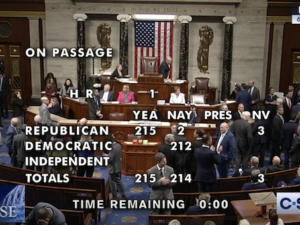
New analysis of the Senate bill from Princeton energy systems modeler Jesse Jenkins
Senate passes bill cutting clean energy tax credits, but several Republican senators help avoid the worst outcomes
By Flannery Winchester
Yesterday afternoon, the Senate passed its version of the budget reconciliation bill that dramatically rolls back America’s clean energy tax credits.
“This is an incredibly pivotal policy moment,” said Jenn Tyler, CCL’s VP of Government Affairs during a training on Monday night before the vote. “We know, right now, our voices are so important.”
In just three days leading up to the vote, CCL volunteers generated 2,793 calls to Senators urging them to vote no and to remove a last-minute additional tax on solar and wind.
Senators Joni Ernst (R-IA), Chuck Grassley (R-IA), and Lisa Murkowski (R-AK) proposed an amendment to strip out that new solar and wind tax, and that amendment was included in the final text. This is great news — it means that our outreach helped pull back the most devastating measures in the Senate version of the bill.
There were a few other improvements, too, like giving new solar and wind projects 1 year to begin construction and qualify for the clean electricity tax credits. CCL Research Manager Dana Nuccitelli calls this change “a bit better than the Senate Finance version, which phased down the tax credit to 60% for solar and wind in 2026. Solar and wind projects would have to rush to begin construction within the next year, but at least that’s something.”
Overall, Princeton energy systems modeler Jesse Jenkins estimates that the Senate-passed bill is about 25% less-bad for the climate and household energy bills than the House-passed version.
Ultimately, the bill passed on a 51-50 vote, with Vice President JD Vance breaking the tie. Republican Senators Rand Paul (KY), Thom Tillis (NC), and Susan Collins (ME) broke with their party and voted no. Senators Collins and Tillis specifically noted the clean energy provisions as one of the reasons for their ‘no’ votes.
“The tax credits that energy entrepreneurs have relied on should have been gradually phased out so as not to waste the work that has already been put into these innovative new projects and prevent them from being completed,” Senator Collins said in a statement. “The bill should have also retained incentives for Maine families who choose to install heat pumps and residential solar panels.”
This Senate vote is the latest step in the ongoing legislative process of this budget reconciliation bill. (Jenn gave a great overview of the process in Monday night’s training, from about minute 7:45 to 17:45, if you want to catch up on the twists and turns.)
Because the Senate version differs from the House version, the bill now goes back to the House for another vote. As a reminder, even with the improvements the Senate version made, it still represents a harmful weakening of clean energy tax credits, and we don’t want to see that happen.
Republicans are pressing toward their ideal timeline of having the bill on President Trump’s desk for a signature by July 4 — but the House is already hitting some bumps in the road, so the window is still open for us to make an impact. Our ask for you right now is to call your representative in the House and let them know this bill shouldn’t advance.
The Senate process just showed us that enough pushback can improve the climate outcomes in this bill — and can even lead to members of Congress voting no because of the devastating impacts to clean energy.
Let’s stay loud and keep up the drumbeat. Call your representative today!





